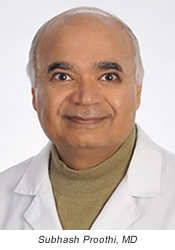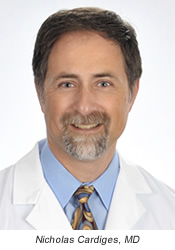The St. Luke’s University Health Network employs a team-approach to diagnose and treat head and neck cancers. This refers to any cancer of the mouth, throat, voice box, nose and sinuses. At St. Luke’s, the Head and Neck Cancer Team meets routinely to review cases and consider treatment options, says medical oncologist Subhash Proothi, MD. The team includes surgeons, medical oncologists, radiation oncologists, otolaryngologists (ears, nose and throat), dentists, physical, occupational and speech therapists, oncology nurse navigators and dietitians. The goal of treatment is to rid the patient of cancer with as few side effects as possible, explains radiation oncologist Nicholas Cardiges, MD. Years ago, cancer patients would receive radiation or chemotherapy separately. Today it is common for patients to receive treatment concurrently. As a result, the team works together to manage the patient’s overall care.
Risk Factors for Developing Head and Neck Cancers
“Historically, 90 percent of head and neck cancers occurred in smokers and heavy drinkers,” says otolaryngologist
(ears, nose and throat physician)
David Yen, MD. “What we’re finding now is that human papillomavirus (HPV) – the same virus that causes warts and
cervical cancer – also plays a role in head and neck cancers. In fact, having a history of multiple sexual partners
seriously increases the risk of head and neck cancers.” Still, smoking and chewing tobacco remain the biggest risk factors.
Symptoms
Often head and neck cancers exhibit few or no symptoms until the disease reaches advanced stages. According to Dr.
Yen, the most common symptom is a painless lump in the neck that lasts for three weeks, a month or more. Another
common symptom is hoarseness or a persistent change in voice. “The key here is persistent voice change, not just
hoarseness because you have a cold or yelled too much during an Eagles game,” he says. A persistent sore throat or one
that lasts a long time is a sign of head and neck cancer. Persistent ear pain is another frequent symptom.
Steps the Patient Can Take to Improve Outlook
Dr. Yen says there are four things someone with cancer can do to improve the likelihood that their treatment will be effective:
- Control his or her attitude. If the patient doesn’t want to fight, there’s not much the care provider can do.
- Eat a balanced diet.
- Seek out treatment from experienced providers offering advanced treatment options.
- Get outside support from spouse, children, friends or a faith community.
“Once you have cancer, you will need a lifetime of care,” Dr. Yen says. “It’s important that you know your care team well and you have faith in them.”





